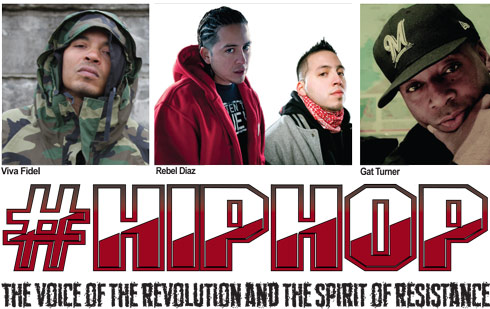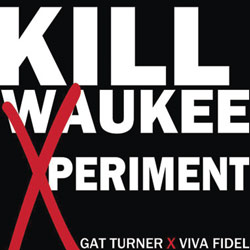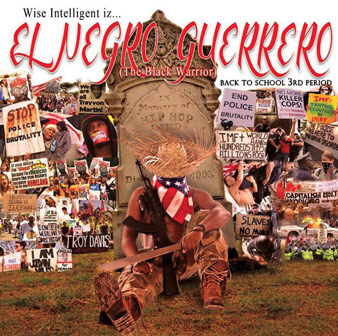#HipHop The voice of the revolution and the spirit of resistance
By Ashahed M. Muhammad -Asst. Editor- | Last updated: Apr 17, 2013 - 11:51:56 AMWhat's your opinion on this article?
More than just rapping, these activists are making a difference, their influence is spreading and it is sneaking up on an arrogant American society

|
(FinalCall.com) - Milwaukee, Wisconsin is probably not the first place you think of when mentioning places you would expect to see a vibrant Hip-Hop scene.
There is a down to earth rugged sensibility that permeates the culture, similar to what you find in Chicago, its neighbor 90 miles south. In Milwaukee, now dubbed “Killwaukee” the scourge of drugs and crime grips areas largely inhabited by Blacks and Latinos. Because of its proximity, many of the most powerful Chicago-based street organizations have also established deep roots there, as well as many of the Black Nationalist activist organizations. Tension runs high between police and its Black and Latino residents, and residents have poor opinions of their political leaders.

|
There are always those who go to war against darkness and corruption, speaking truth to power and giving a voice to the oppressed. The people know them, and you just have to know where to find them. This time, I found Viva Fidel at Will Allen’s Growing Power Deli and Food Market located fittingly on Martin Luther King Jr. Drive, which runs through the heart of the Black community.
Of course, with a name like Viva Fidel, there has to be a story behind it, so I asked him about it.
“I was born with the name Fidel—I was named after Fidel Castro and so Viva Fidel was just something that was always said in my household since I was little so it stuck … once I dropped a mix tape called Viva Fidel people just started calling me that. My mother is actually Black and my father is Mexican and Irish and a lot of other things and so I kind of can weave through a lot of different worlds because of that,” said Fidel.
His parents were largely responsible for his love of music. Listening to greats like Stevie Wonder and Bob Marley, provided him with many audio soundscapes to draw from. He says as long as he can remember, he has been immersed in the culture of Hip-Hop, and because of Milwaukee’s central location, there are a lot of different musical influences present. It would not be uncommon to hear an eclectic mix of musical styles from all regions blasting out of speakers of cars driving throughout the area. There’s also a heavy spoken word community.
This is a testament to the ability of Hip-Hop to travel beyond economic, cultural and geographic boundaries becoming the voice of activism, not only in the United States, but abroad. You are just as likely to see and hear Viva Fidel and his partner in rhyme, Gat Turner speaking at a protest, a community rally or speaking to students at a high school delivering words of self-empowerment, as you are to hear them rocking the mic at an area club.
The same goes for G1, RodStarz and DJ Illanoiz of the revolutionary group Rebel Diaz. I spoke with them in Chicago the night after a gathering commemorating the life and work of Hugo Chavez, then we met again the next day to take it even deeper. They explained that no matter where you go, whether it is Palestinians protesting Israel Defense Force brutality, anti-Apartheid rallies in Soweto, or anti-NATO protests in Chicago, wherever there are revolutionary organizers sharing revolutionary ideas, Hip-Hop provides the soundtrack in the battle against the counter-revolutionary forces involved in suppression.
They’ve gone through their own struggles with the establishment after being forcibly evicted February 28, from a community center they established for the youth in the South Bronx, New York, the poorest congressional district in the United States. No, not among the poorest, the 16th congressional district, encompassing many South Bronx neighborhoods is the poorest in the entire nation. According to the most recent census figures, More than 38 percent of its residents are living in poverty, and a staggering 49 percent of children there live in poverty.
With the help of members of the community and the Bolivarian Revolution, they transformed an old abandoned warehouse into a location called the Rebel Diaz Arts Collective (RDAC-BX) where they’ve hosted forums, panel discussion, performances, and provided a place of safety and refuge on the hallowed grounds where Hip-Hop began.

|
According to the group, the landowner, local commercial developer Marc Pagostin of Austin Property Corp had stalled on negotiations for a new leasing agreement after the original lease expired in November 2012. In January, Mr. Pagostin began refusing rent payments offered by the group.
“I was knocked out I had only had three hours of sleep,” said Illanoiz, who was there the morning the officials conducted the eviction. “I actually thought I was dreaming. I woke up with big bangs and I’m like ‘what’s going on?’ As soon as I get up I see a light on the door handle…they say ‘back away from the door!’”
He said as soon as he backed away, the door was busted open, and he was told he had a few minutes to get whatever he wanted to take, and get out. He was still groggy but he saw police going throughout all the areas of the building.
To Rebel Diaz, this was illustrative of the classic battle between landowner and tenant with an overarching strategy to continue aggressive efforts to gentrify the South Bronx community where RDAC-BX was located. According to a statement from the group: “Austin Property Corp. eventually refused to renew the lease, citing concerns about the group’s political murals, and prompting the surprise eviction.” Particularly troubling for the property management company was a rooftop mural dedicated to freedom for Mumia Abu-Jamal, which drew complaints from the NYPD.
“The space was an abandoned factory when we went in there in November 2008,” said group member G1. “The fact that we are involved in the community, the fact that we did Hip-Hop, the fact that we did political murals that touched upon immigration, that touched upon Troy Davis…it became an issue,” he added.
As an example of the outstanding community work being done, RDAC-BX included a state of the art sound system and projector for viewing documentaries, the Nuestra America Media Center, a place for youth to participate in media production and training, and the Richie Perez Radical Library, named in honor of the longtime community activist and leader in the struggle for social justice who was also leading member of the Young Lords and co-founder of the National Congress for Puerto Rican Rights.
RodStarz said in the Bronx, Brooklyn and Harlem, as well as in other major urban areas such as Chicago and Detroit, a gentrification plan is at work.
“The reality of the situation is that poor people and people of color are getting displaced,” explained RodStarz. “We know that our losing the space for us was just one incident in a larger process of displacement and gentrification that’s occurring in the South Bronx. We added value to that space. This owner to us represents the historic battle between rich and poor. The land owner and the folks that either worked the land or bring value to that land.”
Their activism and disruption of the status quo made them a threat.
“We are clear that this is an issue of gentrification. And at the same time we consider this to be a political attack,” said RodStarz. “Hip-Hop is a culture and generation that has been criminalized. It’s ironic in the sense that our whole political objective with the space was to create a safe place for young people to be. For us we thought that was the most revolutionary act that in the South Bronx was to create a safe space, free of gang violence and police violence, state-sponsored violence and the fact that they violently took that space from us speaks to their violence and the priority of the government officials and police department in New York City,” he added.

Clockwise from left: AK-47, Brother Ali, Immortal Technique, Jasiri X, Rod Starz of Rebel Diaz and Truth Universal.
|
Revolutionary content spurs action
Although Viva Fidel’s music resonates with those seeking justice, and his lyrical wordplay and content is geared more towards those who read books than those who live to party, he doesn’t denounce those who are often criticized by what is often referred to as the “conscious community” for their lyrics promoting excessive drug use, crime and promiscuity. He simply does what he does, and makes music that he likes in hopes that it will connect with like-minded individuals.
“I don’t really have any science or formula or none of that, I just like to make songs that I enjoy,” said Viva Fidel. “I like thinking music. I like stuff that makes me think, I like stuff that makes me go look-up some stuff and then rewind that. And I know there’s other people like me out there, so I’m not afraid to just go there with it,” he added.
Gat Turner is another whose lyrics of fury provide sounds of inspiration and solidarity for those who are involved in societal upheaval and ultimately a societal reconfiguration. The latest collaboration between he and Viva Fidel is the “Killwaukee Xperiment” which includes an inside view into their creative process and community work through online interaction and YouTube videos. He easily explains why his lyrics connect with those with the spirit of resistance.
“I believe that my lyrical content connects so well with those that are critical of the establishment because they are dissatisfied with this current order of things and my lyrics speak to their dissatisfaction,” said Gat Turner. “In many instances it creatively articulates the change that they desire for themselves. We are living in a time of universal change and my music and lyrics are like a herald of that change. I represent an idea whose time has come, and when the people hear it or see it being manifest, it is almost as if they can’t resist it.”
Gat Turner says even if they do resist it, he has the spirit to continue to hurl truth anyway in an authentic manner that resonates with the people.
“I figure if these so-called mainstream artists can stand on what they represent, then I can rep the truth just as hard. Even if the listener isn’t on what I’m on, he or she can still feel me, because I mean what I say,” Gat Turner said.
Many consider Immortal Technique, to be a leading figure in this movement of those using their voices and platforms to enlighten the minds of listeners. He has traveled to Afghanistan working to establish an orphanage there and is always available whenever there is a fundraiser for a righteous cause in service of the people. His latest offering, “The Martyr” provides a soundtrack of the insurgency against the kleptocrats and oligarchs. Despite its name, Tech is not advocating terrorism, it actually refers to how one’s ego and selfish desires must die in order to truly become a revolutionary force for change.
Likewise, the young up and coming group AK-47 are using revolutionary lyrical concepts to move their supporters to positive change through action. Many when they hear the group’s name AK-47 mistakenly draw negative conclusions thinking it refers to the Kalashnikov assault rifle. The young men eagerly destroy those negative thoughts by explaining that their names, Arshad and Khalil, make up the first part, and the 47th surah or chapter of the Holy Qur’an—the book of scripture for those who practice Islam—is titled “Muhammad.”
Other Hip-Hop activists such as Jasiri X and Brother Ali are quite often seen and heard— nationally and internationally—speaking truth to power. They are also doing something else that many consider revolutionary—they are obliterating the previously held notion that you can’t be popular and sell units if you raise political issues, speak to racial and economic disparities, or take on controversial social issues. During last year’s NATO demonstrations in Chicago, protesters wore Jasiri X buttons. He was also one of the featured resistance artists during the protests targeting the Democratic National Convention in Charlotte, NC.
Brother Ali’s latest effort, “Mourning in America and Dreaming in Color” is opening ears, eyes and raising consciousness throughout the land. Ali also recently collaborated with Jasiri X for a song on his newest project titled “Ascension.”

|
Wise Intelligent, another prolific rapper who has always used his influence to educate and enlighten, has a highly anticipated new project titled “El Guerrero Negro” which is scheduled for an April 23rd release.
New Orleans based rap activist Truth Universal is one who also believes in using the mic to mobilize.
“I think that Hip Hop can contribute to grassroots activism by helping to galvanize members of various communities. It can also help to initiate and or continue dialogue on issues that affect the community. It is those discussions that can help move some folks to action,” said Truth Universal.
That is a threat to the existing order and will always be opposed by those who benefit from the system said Rebel Diaz adding that the property eviction has not stopped them, in fact, it has made them better able to conduct asymmetric cultural warfare.
“It’s not a threat to the system when you have young people being dumbed down and their conversation is all about swag or diamonds and how violent they are or the size of the rims on their car. But if you have people talking about it’s cool to read Malcolm X, and it’s cool to learn about the Black Panther Party, that’s what is beautiful to us,” said RodStarz. “Now that we’re out in the street it’s going to be even harder for them to stop us now because now we’re mobile. We’re taking it everywhere and that’s the spirit and it’s the spirit of resistance.”
(There are women involved in this movement as well, such as Palestinian queen of Hip-Hop Shadia Mansour, Detroit-based Invincible and the well-known and diverse performer Queen Yonasda, all highly influential and battling daily against neo-colonialism, neo-liberalism and exploitation. That will be covered in a future article .)
INSIDE STORIES AND REVIEWS
-
-
About Harriett ... and the Negro Hollywood Road Show
By Rabiah Muhammad, Guest Columnist » Full Story -
Skepticism greets Jay-Z, NFL talk of inspiring change
By Bryan 18X Crawford and Richard B. Muhammad The Final Call Newspaper @TheFinalCall » Full Story -
The painful problem of Black girls and suicide
By Charlene Muhammad -National Correspondent- » Full Story -
Exploitation of Innocence - Report: Perceptions, policies hurting Black girls
By Charlene Muhammad -National Correspondent- » Full Story -
Big Ballin: Big ideas fuel a father’s Big Baller Brand and brash business sense
By Bryan Crawford -Contributing Writer- » Full Story






 Click Here Stay Connected!
Click Here Stay Connected!








